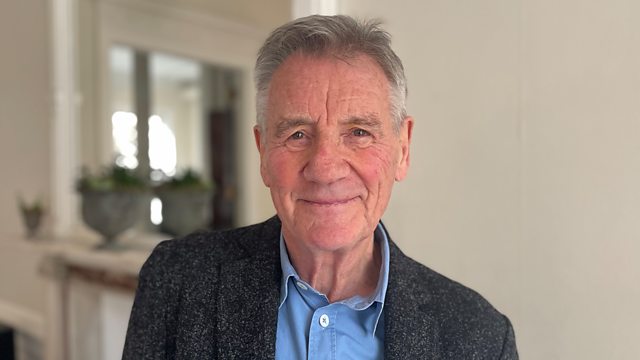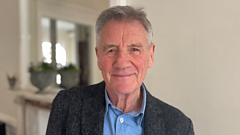
The Brain Charity
Michael Palin presents this month’s Lifeline appeal on behalf of the Brain Charity, an organisation supporting people living with any kind of neurological condition, so they can live longer, healthier and happier lives.
Last on
Clip
-
![]()
Michael Palin’s Lifeline Appeal for The Brain Charity
Duration: 08:25
The Brain Charity

The human brain is the most complex structure in the universe. It is the most important part of who we are, and yet it is so fragile and so easily damaged – the effects of which can be devastating.
There are more than 600 neurological conditions, which are any conditions affecting the brain, spine and nervous system, in existence.
Some appear suddenly, like brain haemorrhage. Others, like autism and dyslexia, you are born with, while some, like motor neurone disease and dementia, develop over time.
The impact of a diagnosis can be devastating; people can lose control of their lives and many face unemployment, poverty, social isolation, discrimination, and poor mental health.
Each year, The Brain Charity helps thousands of people from all over the UK by offering practical help, emotional support and innovative arts-based therapies.
Our Information & Advice Team offer practical, hands-on help on all aspects of what a diagnosis means and what a future living with a neurological condition might look like.
Having a neurological condition means you are twice as likely to have depression or anxiety, and to take your own life.
The Brain Charity’s counselling service is specifically tailored to the needs of people with neurological conditions. We also offer lifeline weekly befriending calls for those who are isolated and lonely.
Finally, The Brain Charity runs The Brain Changer Arts Project to provide specialist neuro-physiotherapy through dance, and occupational therapy through art and crafts, for young people with all forms of neurological condition.
The sessions are designed to stimulate multiple parts of the brain to not only improve their balance, coordination and fine motor skills but build their self-esteem and encourage friendships.
Michael Palin

There are millions of people in the UK living with some form of neurological condition – any condition which affects the brain, spinal cord of nervous system.
In total, neurological conditions affect 1 in 6 people. They each have the potential to wreak havoc on the lives of those they affect; something my family and I can relate to.
My wife was diagnosed with a benign brain tumour more than 25 years ago, and it was a worrying and frightening time for our family.
That’s why the important work of The Brain Charity is a cause very close to my heart.
For someone newly diagnosed with a neurological condition, life can quickly become very lonely and frightening.
The Brain Charity guide and support people through tough times, helping them pick up the pieces so they and their families can rebuild their lives and achieve their potential.
Lindsey

Mum-of-three Lindsey, from Dunbar, was diagnosed with secondary progressive Multiple sclerosis, or MS, in her brain in October 2020.
The 60-year-old former deputy headteacher went from being a highly paid, hard-working professional to wondering how her family was going to survive.
After her diagnosis, Lindsey found there was little concrete information about living with MS available.
She said being given practical advice by The Brain Charity was ‘life-changing’ and reminded her that there was still a future for her.
As well as receiving practical information about how her MS would affect her life to help her process and come to terms with the diagnosis, The Brain Charity also helped Lindsey apply for the benefits she was entitled to, to reduce her financial worries.
Rachel

In February 2019, classroom assistant Rachel, from Cheshire, began to experience severe headaches after a fall at home. She was rushed to hospital, where doctors discovered she had experienced a brain haemorrhage.
Rachel spent two weeks in a coma and, when she woke up, had to learn how to walk and talk again. The haemorrhage had been caused by an AVM, an abnormal cluster of blood vessels which needed complex surgery to be removed.
After her operation, Rachel began to make a physical recovery but struggled mentally – finding it difficult to leave the house due to low confidence around her speech, which had been affected, and experiencing debilitating night terrors that she had back in intensive care.
In May 2020, she was offered a free six-week programme of counselling sessions by The Brain Charity – which she said was a lifeline.
Since then, she has decided to give back to the charity by becoming a volunteer phone befriender, to offer a listening ear to other people experiencing similar situations.
Sammee

Sammee, 18, has Autism Spectrum Disorder (ASD) and recently moved to Liverpool from London.
His ASD primarily affects his social skills and communication. When he started his new college, while he loved talking to adults and teachers, he found it hard to strike up conversations with his peers – a vital social skill for his life post-education.
Since September, Sammee has been taking part in The Brain Charity’s Brain Changer Arts Project – which provides physiotherapy through dance to young people with all forms of neurological condition.
The dance workshops at his college have helped Sammee improve his confidence, his ability to work in groups, pay attention to instructions and express himself creatively.
His teachers have noticed that since taking part, he enjoys chatting with other members of the group and has made new friends around the college.
Credits
| Role | Contributor |
|---|---|
| Presenter | Michael Palin |
| Series Editor | Rob Unsworth |
| Series Producer | Hardeep Giani |
| Director | Charlotte Denton |
Broadcasts
- Mon 20 Dec 2021 13:45
- Tue 21 Dec 2021 08:10

